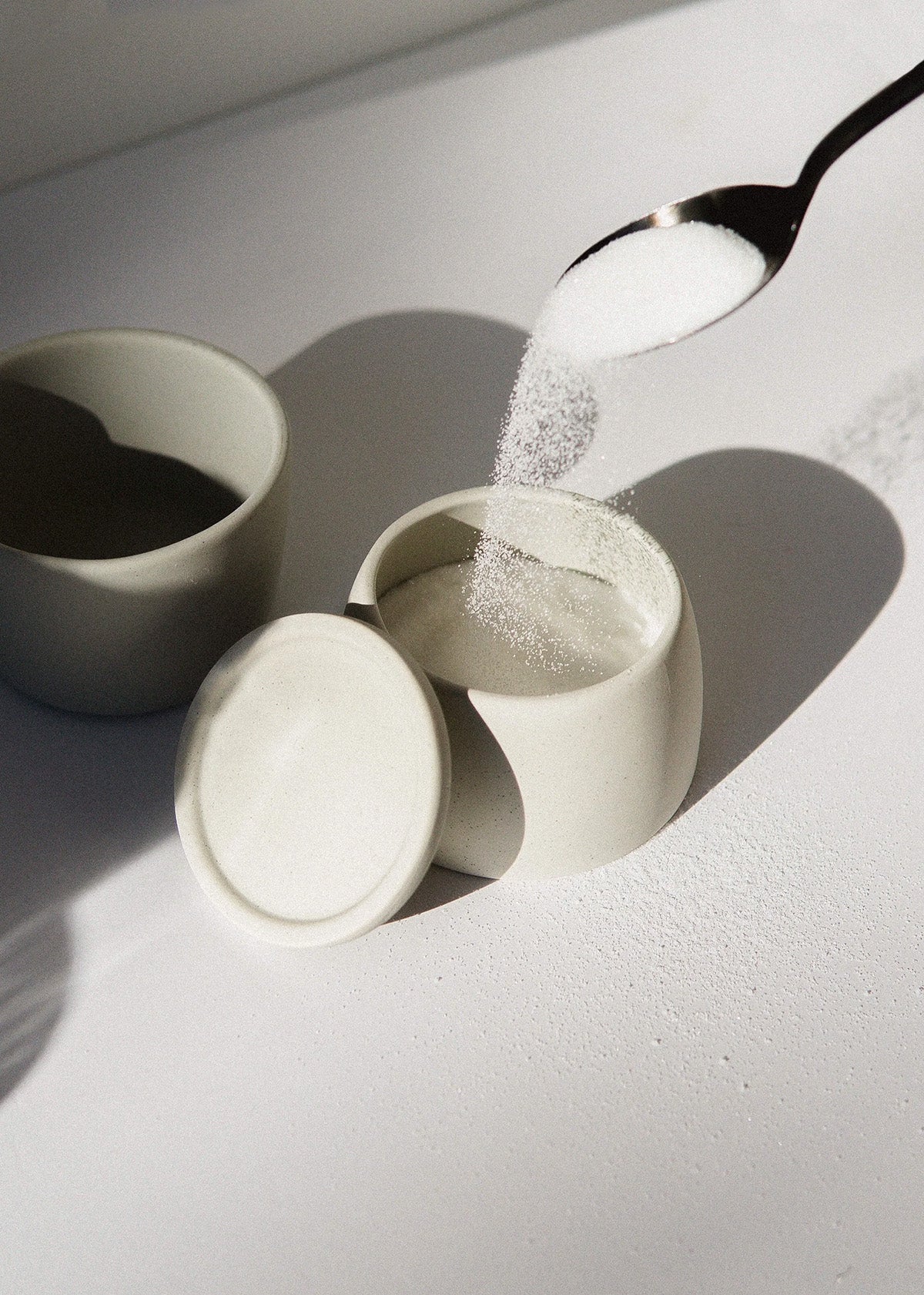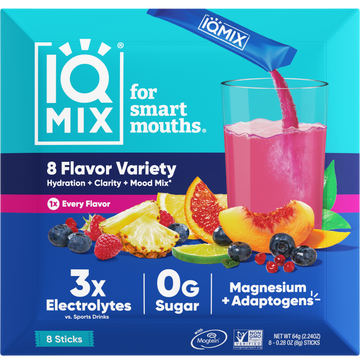Have you ever wondered why athletes reach for sports drinks rather than plain water after a grueling game? Or why parents give their children Pedialyte if they have the stomach flu?
It’s because these drinks provide not only water, but also electrolytes—both of which are needed to combat dehydration. But the role of electrolytes doesn’t stop at hydration. They’re essential for many critical body functions.
In this article, we’ll answer all your electrolyte-related questions, starting with the most basic: What are they anyway?
What Are Electrolytes?
Electrolytes are essential minerals like sodium, magnesium, and potassium that produce an electric charge when you consume them. These electric charges play key roles in many critical bodily functions (more on this shortly).
The electrolytes required by the human body include:
- Sodium
- Potassium
- Magnesium
- Calcium
- Bicarbonate
- Chloride
- Phosphate
Where Do Electrolytes Come From?
Every day, you lose electrolytes through sweat, urine, and feces. On bad days, you lose them through other body fluids (ahem, vomit and diarrhea). Because electrolytes are vital for survival, you must replace the electrolytes you lose by consuming electrolyte-rich foods, drinks, and supplements.
Electrolytes are found in many healthy foods. For example:
- Avocados, bananas, and sweet potatoes are all high in potassium.
- Nuts, seeds, legumes, whole grams, and leafy greens are excellent sources of magnesium.
- Yogurt, legumes, and leafy greens are rich in calcium.
While some foods like celery and beets contain natural sodium, salt (aka sodium chloride) is the most common source of sodium in the diet.
What about sports drinks? Those are a good source of electrolytes, right? While they do contain electrolytes and are marketed as a panacea for dehydration, sports drinks are typically loaded with added sugar—we’re talking 14-19 teaspoons in a 32-ounce drink.
Excess added sugar consumption has been shown to increase your risk of serious health conditions like heart disease, obesity, cognitive decline, and type 2 diabetes, so its inclusion in your diet should be minimal.[*][*][*][*]
An excellent alternative to sports drinks is IQMIX—a sugar-free electrolyte drink mix that contains a hefty dose of sodium, potassium, and magnesium—three key electrolytes that many people are deficient in.
Why Are Electrolytes Important?
Electrolytes aren’t just a health trend—they’re essential for survival. Let’s take a look at the top roles of electrolytes in the body.
#1: Conduct Muscle and Nerve Impulses
As mentioned, electrolytes carry an electrical charge. These charges play key roles in the nervous system and muscle function by triggering nerve impulses and muscle contractions. These functions keep your heart beating, your mind thinking, and your body moving.[*]
#2: Balance Your Body’s pH Levels
To stay healthy, your body must regulate its internal pH—a measure of how acidic or alkaline your blood is.
Electrolytes keep your blood at a healthy pH, which is slightly alkaline and has a pH of 7.35 to 7.45.[*] If electrolytes are imbalanced, your pH level can fluctuate, causing a range of health issues.
#3: Maintains Fluid Balance
Electrolytes, particularly sodium, regulate fluid balance in the body, which refers to the water distribution inside and outside your cells.[*]
Fluid balance is at the heart of healthy hydration. When your water-to-electrolytes ratio is healthy and stable, your cells are properly hydrated. If you’re dehydrated, your cells lack both water and electrolytes.
Many people don’t realize that you can also overhydrate yourself. In this case, the water in your cells exceeds the amount of electrolytes. This occurs when you drink too much plain water without also replenishing your electrolytes.
#4: Other Functions
Electrolytes also play critical roles in blood clotting, maintaining healthy blood pressure, and building new tissue.[*][*]
Understanding Electrolyte Imbalance
When you have too much or too little of certain minerals in your body, you're said to have an electrolyte imbalance.
Your electrolytes can become unbalanced if you’ve been sweating profusely or have had prolonged vomiting or diarrhea. Other causes include not eating enough, certain medications like diuretics, low-carb diets like keto, and aging.
The most common electrolyte imbalance is called hyponatremia, which means the sodium level in your blood is below normal. Hyponatremia can occur from an underlying medical disorder like kidney disease, hormonal changes, or overhydration.
Symptoms of electrolyte imbalance can include:[*]
- Nausea
- Fatigue
- Lethargy
- Vomiting
- Confusion
- Irritability
- Headaches
- Fast or irregular heartbeat
- Muscle cramps or spasms
- Muscle weakness
- Diarrhea or constipation
- Numbness or tingling in limbs, fingers, and toes
Tips for Maintaining Optimal Electrolyte Levels
While a severe electrolyte imbalance can be diagnosed via an electrolyte panel through your healthcare provider, most people don’t realize that your electrolyte levels can still be suboptimal, even if levels come back as normal via blood work.
The best way to determine if you’re getting enough electrolytes is to track a typical week of food consumption using an app like Cronometer. Enter all the food and beverages you consume each day for one week and you’ll be provided with a thorough breakdown of your nutrient consumption, including electrolytes.
If you notice your electrolyte levels are not meeting the requirements, here are some tips to optimize your levels:
- Add targeted, electrolyte-rich foods to your diet: For instance, if you’re low in magnesium, add more whole grains, legumes, and leafy greens to your diet.
- Take a supplement: If you’re coming up short on a certain mineral, you can make up the difference with a supplement. Mineral supplements are readily available in vitamin shops and online.
- Salt your food: If you’re eating primarily whole foods, which are low in sodium, you may not be getting enough of this mineral. To avoid being low in sodium on a whole-food diet, generously salt your food.
- Drink to thirst: Drinking water is essential for hydration, but the amount of water you drink is key. A good rule of thumb is to drink to thirst. This will prevent drinking too much or not enough water.
- Add IQMIX to your routine: IQMIX is a sugar-free electrolyte drink mix formulated with sodium, potassium, and magnesium. It also contains a dose of super-concentrated lion’s mane mushroom, which supports brain health and function.[*] Simply add a packet of IQMIX to a glass of water for an instant electrolyte beverage that combats dehydration.
Wrapping It Up
Electrolytes are essential for more than hydration. Your body depends on them for a slew of critical bodily functions, from muscle contraction to maintaining healthy blood pressure.
While the bulk of your electrolytes should come from your diet, adding IQMIX to your daily routine can help support optimal electrolyte balance, hydration, cognitive performance, mood, and overall wellness.
IQMIX contains only one gram of carbs per packet and no questionable ingredients like artificial sweeteners. It’s available in four delicious flavors: Blood Orange, Lemon Lime, Peach Mango, and Blueberry Pomegranate. To find your favorite flavors, try our 8-Stick Sampler!



